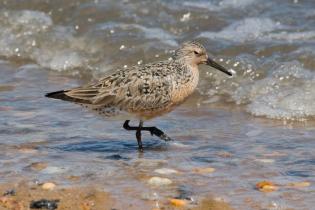Search
Program
Fishing for Energy
The Fishing for Energy partnership provides commercial fishermen with no-cost solutions to dispose of derelict and retired fishing gear and offers competitive grants to reduce the impacts of derelict fishing gear on the environment. By helping prevent and remove derelict gear, Fishing for Energy restores the quality of marine and coastal habitats, and supports the communities and industries that rely on these resources.Image
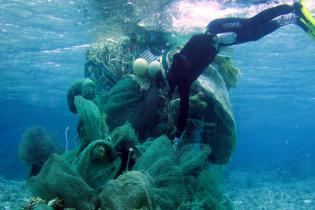
Program
Five Star and Urban Waters Restoration Grant Program
The Five Star and Urban Waters Restoration Program seeks to develop nationwide community stewardship of local natural resources, preserving these resources for future generations and enhancing habitat for local wildlife. Grants seek to address water quality issues in priority watersheds, such as erosion due to unstable streambanks, pollution from stormwater runoff, and degraded shorelines caused by development.Image
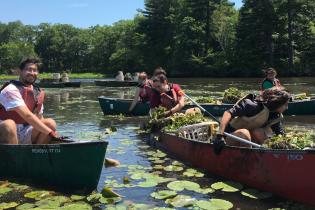
Program
Forestland Stewards
Launched in 2013, the Forestland Stewards Partnership between International Paper and the National Fish and Wildlife Foundation (NFWF) protects and enhances ecologically important forestlands and coastal savannas in ten southern states.Image
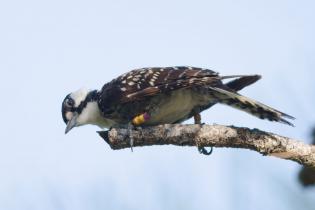
Program
Greenpoint Community Environmental Fund
The Greenpoint Community Environmental Fund is designed to provide environmental improvements and address environmental areas of concern such as water quality, groundwater, open space, reduction of toxic pollution, and air quality in the Greenpoint, Brooklyn community.Image

Program
Gulf Coast Conservation Grants Program
The Gulf Coast Conservation Grants Program will support conservation needs of the Gulf through innovative restoration concepts and approaches, build capacity through strategic engagement of youth and veterans, and fund species and habitat projects.Image
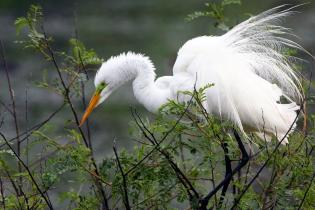
Program
Gulf Environmental Benefit Fund
In early 2013, a U.S. District Court approved two plea agreements resolving certain criminal cases against BP and Transocean which arose from the 2010 Deepwater Horizon explosion and oil spill. The agreements directed a total of $2.544 billion to NFWF to fund projects benefiting the natural resources of the Gulf Coast that were impacted by the spill.Image

Program
Guy Bradley Award
The National Fish and Wildlife Foundation's Guy Bradley Award, presented annually, recognizes individuals for achievements in wildlife law enforcement.Image

Program
Hawai‘i Conservation Program
The National Fish and Wildlife Fund’s Hawai‘i Conservation Program aims to strategically protect and enhance essential habitats in Hawai‘i, from mauka to makai (from the mountains to the ocean), to reduce extinction risk and sustain resilient populations of native species.Image
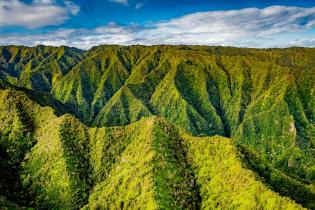
Program
Hurricane Response Marine Debris Removal Fund
The Hurricane Response Marine Debris Removal Fund is a partnership between NFWF and the NOAA Marine Debris Program that awards grants to assess, remove and dispose of marine debris caused by severe storms. Grants are awarded based on the targeted debris’ existing or potential impact to coastal communities and resources, and to prevent further harm to sensitive marine habitats and species listed under the Endangered Species Act.Image
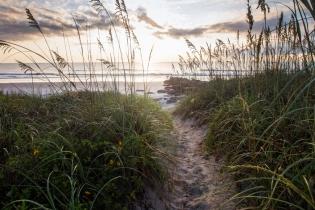
Program
Hurricane Sandy Coastal Resiliency Competitive Grant Program
The Hurricane Sandy Coastal Resiliency Competitive Grant Program (Hurricane Sandy Program) was designed to restore key habitats and bolster natural systems, enabling them to withstand the impacts of future storms. The Program funded 78 projects in 12 states and Washington, D.C., with the bulk of projects in states hardest hit by the hurricane, including: New Jersey, New York, Connecticut, Delaware, Maryland, Massachusetts, New Hampshire, Ohio, Pennsylvania, Rhode Island, Virginia, West Virginia, and the District of Columbia. The Hurricane Sandy Program is no longer active. Applicants seeking grants for coastal resilience projects are encouraged to consider the National Coastal Resilience Fund, and NFWF’s regionally-focused coastal programs, including the Long Island Sound Futures Fund, Delaware Watershed Conservation Fund and Chesapeake Bay Stewardship Fund.Image
